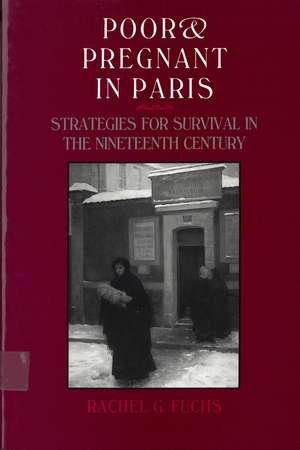Poor and Pregnant in Paris: Strategies for Survival in the Nineteenth Century
Autor Rachel Fuchsen Limba Engleză Hardback – iun 1992
Rachel Fuchs shows how poor urban women in Paris negotiated their environment, and in some respects helped shape it, in their attempt to cope with their problems of poverty and pregnancy. She reveals who the women were and provides insight into the nature of their work and living arrangements. With dramatic detail, and drawing on actual court testimonies, Fuchs portrays poor women's childbirth experiences, their use of charity and welfare, and their recourse to abortion and infanticide as desperate alternatives to motherhood.
Fuchs also provides a comprehensive description of philanthropic and welfare institutions and outlines the relationship between the developing welfare state and official conceptions of womanhood. She traces the evolution of a new morality among policymakers in which secular views, medical hygiene, and a new focus on the protection of children replaced religious morality as a driving force in policy formation.
Combining social, intellectual, and medical history, this study of poor mothers in nineteenth-century society illuminates both class and gender relations in Paris, and illustrates the connection between social policy and the way ordinary women lived their lives.
Fuchs also provides a comprehensive description of philanthropic and welfare institutions and outlines the relationship between the developing welfare state and official conceptions of womanhood. She traces the evolution of a new morality among policymakers in which secular views, medical hygiene, and a new focus on the protection of children replaced religious morality as a driving force in policy formation.
Combining social, intellectual, and medical history, this study of poor mothers in nineteenth-century society illuminates both class and gender relations in Paris, and illustrates the connection between social policy and the way ordinary women lived their lives.
Preț: 327.13 lei
Nou
Puncte Express: 491
Preț estimativ în valută:
62.59€ • 65.59$ • 51.75£
62.59€ • 65.59$ • 51.75£
Carte indisponibilă temporar
Doresc să fiu notificat când acest titlu va fi disponibil:
Se trimite...
Preluare comenzi: 021 569.72.76
Specificații
ISBN-13: 9780813517797
ISBN-10: 0813517796
Pagini: 344
Dimensiuni: 152 x 229 x 15 mm
Greutate: 0.71 kg
Ediția:None
Editura: Rutgers University Press
Colecția Rutgers University Press
ISBN-10: 0813517796
Pagini: 344
Dimensiuni: 152 x 229 x 15 mm
Greutate: 0.71 kg
Ediția:None
Editura: Rutgers University Press
Colecția Rutgers University Press
Notă biografică
RACHEL FUCHS is an associate professor of history at Arizona State University.
Cuprins
List of Illustrations
Acknowledgments
Introduction
Chapter 1. The Poor and Pregnant
Chapter 2. Immorality and Motherhood: 1830-1870
Chapter 3. Depopulation and Motherhood: 1870-1914
Chapter 4. Morality and Motherhood: Women's Voices
Chapter 5. Charity and Welfare for the Pregnant Poor
Chapter 6. Charity and Welfare for New Mothers and Infants
Chapter 7. Mothers on Welfare
Chapter 8. Birth Control and Abortion
Chapter 9. Infanticide and Child Abandonment
Conclusion
Notes
Archival Sources
Selected Bibliography
Index
Acknowledgments
Introduction
Chapter 1. The Poor and Pregnant
Chapter 2. Immorality and Motherhood: 1830-1870
Chapter 3. Depopulation and Motherhood: 1870-1914
Chapter 4. Morality and Motherhood: Women's Voices
Chapter 5. Charity and Welfare for the Pregnant Poor
Chapter 6. Charity and Welfare for New Mothers and Infants
Chapter 7. Mothers on Welfare
Chapter 8. Birth Control and Abortion
Chapter 9. Infanticide and Child Abandonment
Conclusion
Notes
Archival Sources
Selected Bibliography
Index
Descriere
Rachel Fuchs shows how poor urban women in Paris negotiated their environment, and in some respects helped shape it, in their attempt to cope with their problems of poverty and pregnancy. She reveals who the women were and provides insight into the nature of their work and living arrangements. With dramatic detail, and drawing on actual court testimonies, Fuchs portrays poor women's childbirth experiences, their use of charity and welfare, and their recourse to abortion and infanticide as desperate alternatives to motherhood.
